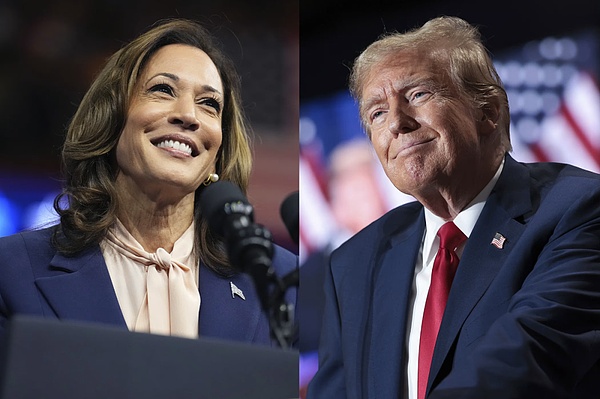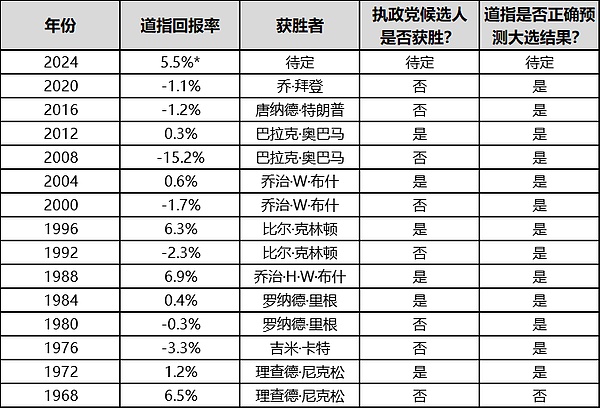The Dow's performance in the 11 weeks leading up to Election Day correlates with whether the incumbent party's candidate wins the presidential election since 1968.
With less than a month to go until the U.S. presidential election, polls show Trump and Harris are essentially tied. No one can say who will win in the end, but if historical data is any guide, the outcome of the election may depend on the performance of the U.S. stock market between now and Election Day.
A new report from the Leuthold Group, a stock market research firm, says the Dow Jones Industrial Average could play a decisive role. The Dow Jones Industrial Average has risen nearly 12% this year. If it continues to rise, then Vice President Harris could win the election. If the Dow falls, former President Trump could win.

The long-standing rule of thumb suggests that if the U.S. stock market rises in the three months before Election Day, the incumbent party candidate usually wins. Leuthold Group noted that the method uses the S&P 500 index as a measure of stock market performance and has correctly predicted the results of 20 of the past 24 presidential elections since 1928.
In search of a better forecasting tool, this time Leuthold Group adjusted its method, studying the performance of the Dow Jones Industrial Average rather than the S&P 500 in the 11 weeks (rather than 12 weeks) before Election Day. Leuthold Group analyzed the data and found that the Dow Jones Industrial Average correctly predicted the results of 22 of the past 24 elections, which means that the method correctly predicted the winner 92% of the time. The two times it was wrong were Dwight Eisenhower's re-election in 1956 and Richard Nixon's victory over Hubert Humphrey during the Vietnam War in 1968.
Probability of the Dow Jones Industrial Average correctly predicting the results of the US presidential election
The Dow's movement in the 11 weeks before the election is related to whether the incumbent party candidate wins the presidential election since 1968.

Note: Dow returns are the returns in the 11 weeks before Election Day; 2024 data is as of the close of trading on October 7.
Source: Leuthold Group; Dow Jones Market Data
These statistics also have shortcomings. First, because both methods rely on stock market returns before Election Day, their predictive value is limited. The 11-week window studied by the Leuthold Group began on August 13. The Dow has risen 5.5% since August 13, which is a good sign for Harris, but anything can happen in the stock market between now and November 5, such as the 0.9% drop in the Dow on Monday (October 7).
Also, while it's easy to see how the stock market's movements could affect voter sentiment, it's hard not to get the impression that the 11-week window is the result of filtering data, something the Leuthold Group acknowledges.
However, there is some validity to the Leuthold Group's forecasting approach. The Dow Jones Industrial Average hit another record high on Friday, boosted by a strong jobs report, and Harris has maintained a slim but steady lead in the polls, with recent polls showing she's gaining some support among voters on the economy, which has been the most important issue in the U.S. presidential election.
Voters are also likely to come to different conclusions when looking at the same stock market data. According to the Pew Research Center, only about 58% of American households own stocks. Most voters ultimately care less about the stock market than the economy. While the stock market is generally a good indicator of the overall health of the economy, experts have been talking about the disconnect between stock market performance and consumer confidence for months.
Moreover, voters may care more about other issues—from wars to immigration to the candidates themselves—than they do about the stock market’s performance.
So it’s hard to ignore the last time the Dow failed to correctly predict the outcome of an election. The 1968 election featured a deeply divided electorate, as the incumbent president withdrew after deciding he couldn’t win, while the then-vice president fought to replace him.
The study of stock returns provides another data point for predicting the winner of the upcoming election, but whoever wins is likely to win no matter what the Dow says.
 Weiliang
Weiliang








